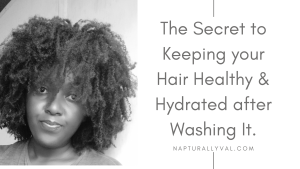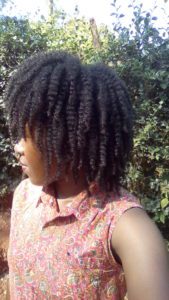When it comes to 4C natural hair, washing routines can be tricky. Some people recommend washing frequently to keep the scalp clean and healthy, while others advise against washing too often to prevent dryness and breakage. So, how often should you wash 4C natural hair? The answer depends on various factors such as your lifestyle, hair condition, and the products you use.
In this post, we’ll dive into the specifics of how often you should wash your 4C hair, what products to use, and how to maintain a healthy balance between moisture and cleanliness. Let’s clear up the confusion!
Feel like your hair has been the same length forever, I’ve an Ebook that will help you grow your hair healthier, longer and thicker. Grab your copy here… Also, check out all the Ebooks,guides and journals that will go a long way in your hair care journey here.
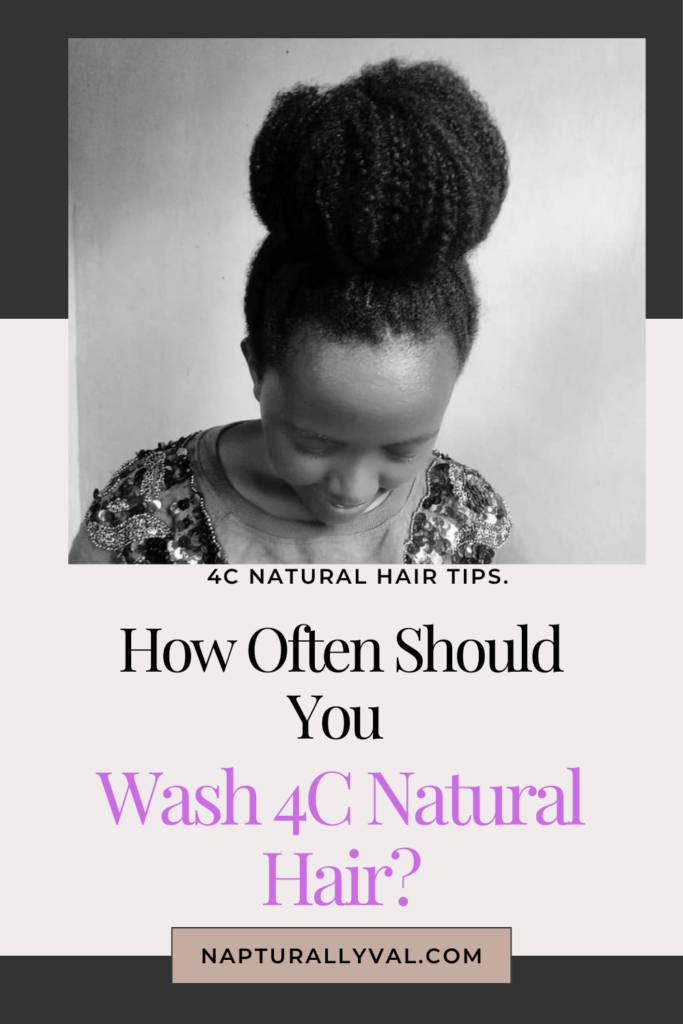
Table of Contents
How Frequently Should you Cleanse Without Drying Out 4C Hair?
Understanding 4C Hair
Before jumping into washing routines, it’s important to understand the unique characteristics of 4C hair. 4C hair is the tightest of the curl patterns in the hair typing system. It’s characterized by densely packed coils that are prone to shrinkage and dryness. The curls are so tight that it can be hard for natural oils from the scalp to travel down the hair shaft, leading to drier hair compared to looser curl patterns.
Because of this natural dryness, 4C hair tends to need more moisture and less frequent washing compared to other hair types. Washing too often can strip the hair of its natural oils, which are essential for keeping it moisturized and healthy.
So, How Often Should You Wash 4C Hair?
There’s no one-size-fits-all answer, but the general recommendation is to wash 4C natural hair every 1-2 weeks. Some people may go as long as three weeks between washes, while others might feel the need to cleanse weekly. It really depends on your hair’s individual needs and how it responds to washing.
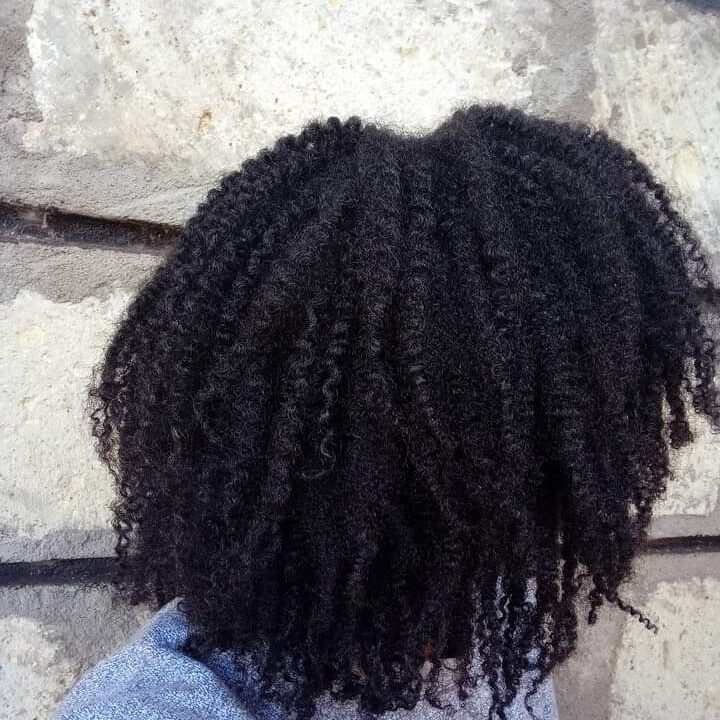
Let’s break down the factors that can influence how often you should wash your 4C hair:
1. Lifestyle and Activity Level
- Active Lifestyle: If you work out regularly or sweat a lot, you may need to wash your hair more often. Sweat and dirt can build up on the scalp, leading to irritation and clogged pores. In this case, you might find washing your hair weekly or even more frequently beneficial to keep your scalp clean and healthy.
- Low Activity Lifestyle: On the flip side, if you’re not sweating or exposed to environmental pollutants as much, you can get away with washing less frequently, perhaps every two to three weeks. You can stretch your washes with regular co-washing (washing with conditioner) in between.
If you use a lot of heavy products like oils, creams, or gels, you might find that your hair and scalp get weighed down by product buildup. Buildup can clog your scalp pores, which could slow down hair growth and lead to scalp issues. In this case, you’ll need to wash your hair more often to remove excess products from your scalp and strands.
You can check for buildup if your hair starts to feel greasy or sticky, or if your scalp feels itchy sooner than usual after applying products. When this happens, it’s time to wash.
Hair porosity refers to your hair’s ability to absorb and retain moisture. If you have low-porosity hair (which many with 4C hair do), your hair may take longer to absorb moisture but also holds onto moisture for a longer time. This means you might not need to wash your hair as often, especially if your moisture routine is on point.
For those with high-porosity hair, moisture tends to escape the hair shaft faster, which can result in dry hair. If your hair feels dry frequently, you may need to wash less often and follow up with moisturizing treatments to keep your hair hydrated.

4. Scalp Health
A healthy scalp is key to growing strong and beautiful 4C hair. If your scalp tends to be oily, itchy, or prone to dandruff, you might need to wash your hair more often. Keeping your scalp clean and free of buildup will help promote healthy hair growth. If your scalp is dry and doesn’t produce a lot of oil, you can wash less frequently and focus on keeping it moisturized.
Look out for signs like flakes, itchiness, or tenderness—these may indicate that it’s time for a wash.
The Importance of Pre-Pooing
Before you wash your hair, consider pre-pooing, which is applying an oil or conditioner to your dry hair before shampooing. This step helps protect your hair from the harsh effects of shampoo by providing an extra layer of moisture.
Some great pre-poo options include:
- Coconut oil
- Olive oil
- Aloe vera gel
- Rinse off conditioner
Let the pre-poo sit on your hair for about 20-30 minutes (or longer if your hair is extremely dry) before washing. This will prevent your hair from drying out during the shampoo process.
Shampooing: Sulfate-Free is Key
When it’s time to wash your 4C hair, choose a sulfate-free shampoo. Sulfates are harsh detergents that can strip the hair of its natural oils, which is the last thing you want for your already dry-prone 4C curls. A sulfate-free shampoo is gentler and won’t leave your hair feeling like straw after washing.
Here are some great sulfate-free shampoos for 4C hair:
- SheaMoisture Jamaican Black Castor Oil Shampoo
- As I Am Coconut CoWash (a gentle co-wash option)
- Aunt Jackie’s Curls and Coils Oh So Clean Deep Moisturizing and Softening Hair Shampoo.
You don’t need a ton of shampoo, either—focus mainly on the scalp. Use the pads of your fingers or scalp massager to massage the shampoo into your scalp to loosen dirt and buildup. When you rinse the shampoo out, the lather will clean the rest of your hair as it runs down the strands.

Co-Washing for Mid-Week Cleansing
If you feel like your hair needs a little refresh in between washes but you don’t want to strip it with shampoo, co-washing is a great option. Co-washing (conditioner washing) is simply washing your hair with a conditioner instead of shampoo. This method allows you to cleanse your hair gently without removing the moisture that your 4C hair needs.
Products like the As I Am Coconut CoWash or Eden BodyWorks Coconut Shea CoWash are excellent for mid-week moisture and light cleansing.
Deep Conditioning: The Must-Have Step
One of the most important parts of any 4C hair routine, whether you wash weekly or biweekly, is deep conditioning. Deep conditioners penetrate the hair shaft to provide moisture, softness, and strength.
You should deep condition every time you wash your hair. For maximum effectiveness, apply a deep conditioner, cover your hair with a shower cap, and let it sit for at least 20-30 minutes. For extra hydration, use heat by sitting under a hooded dryer or using a heated cap to open up the hair cuticles and allow the product to penetrate more deeply.
Some top deep conditioners for 4C hair include:
- SheaMoisture Intensive Hydration Hair Masque Manuka Honey & Mafura Oil
- TGIN Honey Miracle Hair Mask
- Alikay Naturals Honey and Sage Deep Conditioner
- Camille Rose Algae Renew Deep Conditioning Hair Mask.
Post-Wash: Moisturize and Seal in Moisture
Once you’ve washed and conditioned your hair, the next step is to lock in all that moisture. Apply a leave-in conditioner while your hair is still damp to help your curls stay hydrated.
Some excellent leave-in conditioners include:
- OKAY Black Jamaican Castor Oil Moisture Growth Leave In Conditioner.
- Artnaturals Argan Oil Leave-In Conditioner
- Creme Of Nature, Knot Away Leave in Detangler, Pure Honey, Coconut Oil And Shea Butter Formula, Leave in Conditioner
- SheaMoisture Jamaican Black Castor Oil Leave-In Conditioner
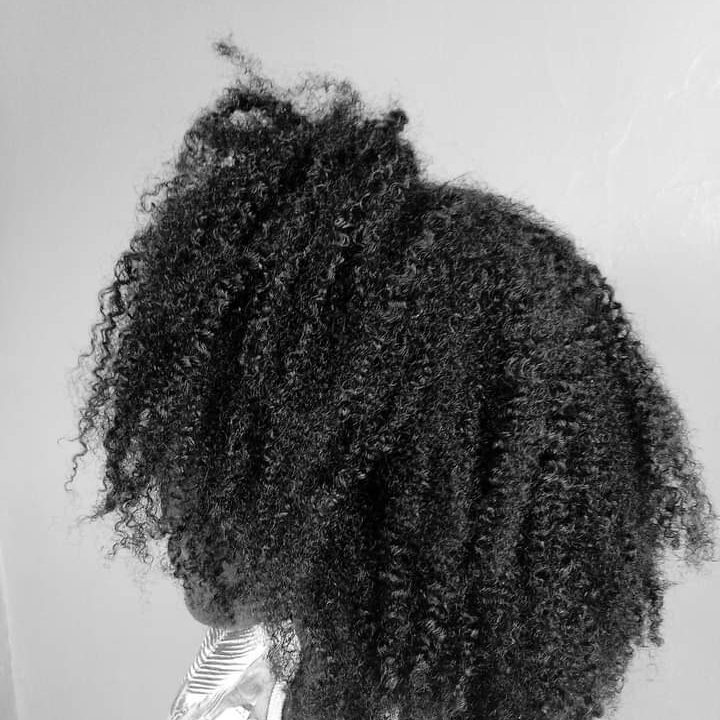
After applying your leave-in, follow up with an oil or cream to seal in the moisture. This step ensures that your hair stays hydrated and protected until your next wash day.
Final Thoughts
The frequency of washing 4C hair varies depending on your lifestyle, product usage, and hair condition. Most naturals with 4C hair find that washing every 1-2 weeks works best to maintain a healthy balance between moisture and cleanliness. However, remember that it’s not just about how often you wash your hair, but how you wash and care for it afterward.
With the right routine, products, and techniques, your 4C hair will thrive, growing healthy, strong, and full of life!


